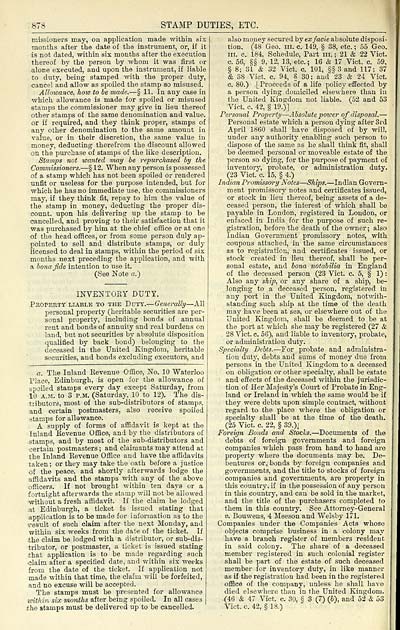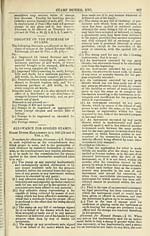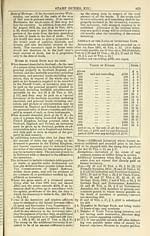Download files
Complete book:
Individual page:
Thumbnail gallery: Grid view | List view

878
STAMP DUTIES, ETC.
missioners may, on application made within six
months after the date of the instrument, or, if it
is not dated, within six months after the execution
thereof by the person by whom it was first or
alone executed, and upon the instrument, if liable
to duty, being stamped with the proper duty,
cancel and allow as spoiled the stamp so misused.
Allowance, how to be made. — § 11. In any case in
which allowance is made for spoiled or misused
stamps the commissioner may give in lieu thereof
other stamps of the same denomination and value,
or if required, and they think proper, stamps of
any other denomination to the same amount in
value, or in their discretion, the same value in
money, deducting therefrom the discount allowed
on the purchase of stamps of the like description.
Stamps not wanted may be repurchased by the
Commissioners. — § 12. When any person is possessed
of a stamp which has not been spoiled or rendered
unfit or useless for the purpose intended, but for
which he has no immediate use, the commissioners
may, if they think fit, repay to him the value of
the stamp in money, deducting the proper dis-
count, upon his delivering up the stamp to be
cancelled, and proving to their satisfaction that it
was purchased by him at the chief office or at one
of the head offices, or from some person duly ap-
pointed to sell and distribute stamps, or duly
licensed to deal in stamps, within the period of six
months next preceding the application, and with
a bona fide intention to use it.
(See Note a.)
INVENTORY DUTY.
Property liable to the Duty. — Generally — All
personal property (heritable securities are per-
sonal property, including bonds of annual
rent and bonds of annuity and real burdens on
land, but not securities by absolute disposition
qualified by back bond) belonging to the
deceased in the United Kingdom, heritable
securities, and bonds excluding executors, and
a. The Inland Revenue Office, No. 10 Waterloo
Place, Edinburgh, is open for the allowance of
spoiled stamps every day except Saturday, from
10 a.m. to 3 p.m. (Saturday, 10 to 12). The dis-
tributors, most of the sub-distributors of stamp?.
and certain postmasters, also receive spoiled
stamps for allowance.
A supply of forms of affidavit is kept at the
Inland Revenue Office, and by the distributors of
stamps, and by most of the sub-distributors and
certain postmasters ; and claimants may attend at
the Inland Revenue Office and have the affidavits
taken ; or they may take the oath before a justice
of the peace, and shortly afterwards lodge the
affidavits and the stamps with any of the above
officers. If not brought within ten days or a
fortnight afterwards the stamp will not be allowed
without a fresh affidavit. If the claim be lodged
at Edinburgh, a ticket is issued stating that
application is to be made for information as to the
result of such claim after the next Monday, and
within six weeks from the date of the ticket. If
the claim be lodged with a distributor, or sub-dis-
tributor, or postmaster, a ticket is issued stating
that application is to be made regarding such
claim after a specified date, and within six weeks
from the date of the ticket. If application not
made within that time, the claim will be forfeited,
and no excuse will be accepted.
The stamps must be presented for allowance
within six months after being spoiled. In all cases
the stamps must be delivered up to be cancelled.
also money secured by ex facie absolute disposi-
tion. (48 Geo. in. c. 149, § 38, etc. ; 55 Geo.
in. c. 184, Schedule, Part in. ; 21 & 22 "Vict,
c. 56, §§ 9, 12, 13, etc. ; 16 & 17 Vict. c. 59,
§ 8; 31 & 32 Vict. c. 101, §§ 3 and 117; 37
& 38 Vict. c. 94, § 30; and 23 & 24 Vict,
c. 80.) [Proceeds of a life policy effected by
a person dying domiciled elsewhere than in
the United Kingdom not liable. (52 and 53
' Vict. c. 42, § 19.)]
Personal Property — Absolute poxver of disposal. —
Personal estate which a person dying after 3rd
April 1860 shall have disposed of by will,
under any authority enabling such person to
dispose of the same as he shall think fit, shall
be deemed personal or moveable estate of the
person so dying, for the purpose of payment of
inventory, probate, or administration duty.
(23 Vict. c. 15, § 4.)
Indian Promissory Notes— Ships. — Indian Govern-
ment promissory notes and certificates issued,
or stock in lieu thereof, being assets of a de-
ceased person, the interest of which shall be
payable in London, registered in London, or
eniaced in India for the purpose of such re-
gistration, before the death of the owner ; also
Indian Government promissory notes, with
coupons attached, in the same circumstances
as to registration, and certificates issued, or
stock created in lieu thereof, shall be per-
sonal estate, and bona notabilia in England
of the deceased person (23 Vict. c. 5, § 1) :
Also any ship, or any share of a ship, be-
longing to a deceased person, registered in
any port in the United Kingdom, notwith-
standing such ship at the time of the death
may have been at sea, or elsewhere out of the
United Kingdom, shall be deemed to be at
the port at which she may be registered (27 &
28 Vict. c. 56), and liable to inventory, probate,
or administration duty.
Specialty Debts. — For probate and administra-
tion duty, debts and sums of money due from
persons in the United Kingdom to a deceased
on obligation or other specialty, shall be estate
and effects of the deceased within the jurisdic-
tion of Her Majesty's Court of Probate in Eng-
land or Ireland in which the same would be if
they wei - e debts upon simple contract, without
regard to the place where the obligation or
specialty shall be at the time of the death.
(25 Vict. c. 22, § 39.)J
Foreign Bonds and Stocks. — Documents of the
debts of foreign governments and foreign
companies which pass from hand to hand are
property where the documents may be. De-
bentures or, bonds by foreign companies and
governments, and the title to stocks of foreign
companies and governments, are property in
this country, if in the possession of any person
in this country, and can be sold in the market,
and the title of the purchasers completed to
them in this country. See Attorney-General
v. Bouwens, 4 Meeson and Welsby 171.
Companies under the Companies Acts whoso
objects comprise business in a colony may
have a branch register of members resident
in said colony. The share of a deceased
member registered in such colonial register
shall be part of the estate of such deceased
member for inventory duty, in like manner
as if the registration had been in the registered
office of the company, unless he shall have
died elsewhere than in the United Kingdom.
.(46 & 47 Vict. c. 30, § 3 (7) (6), and 52 & 53
Vict. c. 42, § 18.)
STAMP DUTIES, ETC.
missioners may, on application made within six
months after the date of the instrument, or, if it
is not dated, within six months after the execution
thereof by the person by whom it was first or
alone executed, and upon the instrument, if liable
to duty, being stamped with the proper duty,
cancel and allow as spoiled the stamp so misused.
Allowance, how to be made. — § 11. In any case in
which allowance is made for spoiled or misused
stamps the commissioner may give in lieu thereof
other stamps of the same denomination and value,
or if required, and they think proper, stamps of
any other denomination to the same amount in
value, or in their discretion, the same value in
money, deducting therefrom the discount allowed
on the purchase of stamps of the like description.
Stamps not wanted may be repurchased by the
Commissioners. — § 12. When any person is possessed
of a stamp which has not been spoiled or rendered
unfit or useless for the purpose intended, but for
which he has no immediate use, the commissioners
may, if they think fit, repay to him the value of
the stamp in money, deducting the proper dis-
count, upon his delivering up the stamp to be
cancelled, and proving to their satisfaction that it
was purchased by him at the chief office or at one
of the head offices, or from some person duly ap-
pointed to sell and distribute stamps, or duly
licensed to deal in stamps, within the period of six
months next preceding the application, and with
a bona fide intention to use it.
(See Note a.)
INVENTORY DUTY.
Property liable to the Duty. — Generally — All
personal property (heritable securities are per-
sonal property, including bonds of annual
rent and bonds of annuity and real burdens on
land, but not securities by absolute disposition
qualified by back bond) belonging to the
deceased in the United Kingdom, heritable
securities, and bonds excluding executors, and
a. The Inland Revenue Office, No. 10 Waterloo
Place, Edinburgh, is open for the allowance of
spoiled stamps every day except Saturday, from
10 a.m. to 3 p.m. (Saturday, 10 to 12). The dis-
tributors, most of the sub-distributors of stamp?.
and certain postmasters, also receive spoiled
stamps for allowance.
A supply of forms of affidavit is kept at the
Inland Revenue Office, and by the distributors of
stamps, and by most of the sub-distributors and
certain postmasters ; and claimants may attend at
the Inland Revenue Office and have the affidavits
taken ; or they may take the oath before a justice
of the peace, and shortly afterwards lodge the
affidavits and the stamps with any of the above
officers. If not brought within ten days or a
fortnight afterwards the stamp will not be allowed
without a fresh affidavit. If the claim be lodged
at Edinburgh, a ticket is issued stating that
application is to be made for information as to the
result of such claim after the next Monday, and
within six weeks from the date of the ticket. If
the claim be lodged with a distributor, or sub-dis-
tributor, or postmaster, a ticket is issued stating
that application is to be made regarding such
claim after a specified date, and within six weeks
from the date of the ticket. If application not
made within that time, the claim will be forfeited,
and no excuse will be accepted.
The stamps must be presented for allowance
within six months after being spoiled. In all cases
the stamps must be delivered up to be cancelled.
also money secured by ex facie absolute disposi-
tion. (48 Geo. in. c. 149, § 38, etc. ; 55 Geo.
in. c. 184, Schedule, Part in. ; 21 & 22 "Vict,
c. 56, §§ 9, 12, 13, etc. ; 16 & 17 Vict. c. 59,
§ 8; 31 & 32 Vict. c. 101, §§ 3 and 117; 37
& 38 Vict. c. 94, § 30; and 23 & 24 Vict,
c. 80.) [Proceeds of a life policy effected by
a person dying domiciled elsewhere than in
the United Kingdom not liable. (52 and 53
' Vict. c. 42, § 19.)]
Personal Property — Absolute poxver of disposal. —
Personal estate which a person dying after 3rd
April 1860 shall have disposed of by will,
under any authority enabling such person to
dispose of the same as he shall think fit, shall
be deemed personal or moveable estate of the
person so dying, for the purpose of payment of
inventory, probate, or administration duty.
(23 Vict. c. 15, § 4.)
Indian Promissory Notes— Ships. — Indian Govern-
ment promissory notes and certificates issued,
or stock in lieu thereof, being assets of a de-
ceased person, the interest of which shall be
payable in London, registered in London, or
eniaced in India for the purpose of such re-
gistration, before the death of the owner ; also
Indian Government promissory notes, with
coupons attached, in the same circumstances
as to registration, and certificates issued, or
stock created in lieu thereof, shall be per-
sonal estate, and bona notabilia in England
of the deceased person (23 Vict. c. 5, § 1) :
Also any ship, or any share of a ship, be-
longing to a deceased person, registered in
any port in the United Kingdom, notwith-
standing such ship at the time of the death
may have been at sea, or elsewhere out of the
United Kingdom, shall be deemed to be at
the port at which she may be registered (27 &
28 Vict. c. 56), and liable to inventory, probate,
or administration duty.
Specialty Debts. — For probate and administra-
tion duty, debts and sums of money due from
persons in the United Kingdom to a deceased
on obligation or other specialty, shall be estate
and effects of the deceased within the jurisdic-
tion of Her Majesty's Court of Probate in Eng-
land or Ireland in which the same would be if
they wei - e debts upon simple contract, without
regard to the place where the obligation or
specialty shall be at the time of the death.
(25 Vict. c. 22, § 39.)J
Foreign Bonds and Stocks. — Documents of the
debts of foreign governments and foreign
companies which pass from hand to hand are
property where the documents may be. De-
bentures or, bonds by foreign companies and
governments, and the title to stocks of foreign
companies and governments, are property in
this country, if in the possession of any person
in this country, and can be sold in the market,
and the title of the purchasers completed to
them in this country. See Attorney-General
v. Bouwens, 4 Meeson and Welsby 171.
Companies under the Companies Acts whoso
objects comprise business in a colony may
have a branch register of members resident
in said colony. The share of a deceased
member registered in such colonial register
shall be part of the estate of such deceased
member for inventory duty, in like manner
as if the registration had been in the registered
office of the company, unless he shall have
died elsewhere than in the United Kingdom.
.(46 & 47 Vict. c. 30, § 3 (7) (6), and 52 & 53
Vict. c. 42, § 18.)
Set display mode to: Large image | Transcription
Images and transcriptions on this page, including medium image downloads, may be used under the Creative Commons Attribution 4.0 International Licence unless otherwise stated. ![]()
| Scottish Post Office Directories > Towns > Edinburgh > Post Office Edinburgh and Leith directory > 1892-1893 > (936) |
|---|
| Permanent URL | https://digital.nls.uk/83665806 |
|---|
| Description | Directories of individual Scottish towns and their suburbs. |
|---|
| Description | Around 700 Scottish directories published annually by the Post Office or private publishers between 1773 and 1911. Most of Scotland covered, with a focus on Edinburgh, Glasgow, Dundee and Aberdeen. Most volumes include a general directory (A-Z by surname), street directory (A-Z by street) and trade directory (A-Z by trade). |
|---|


